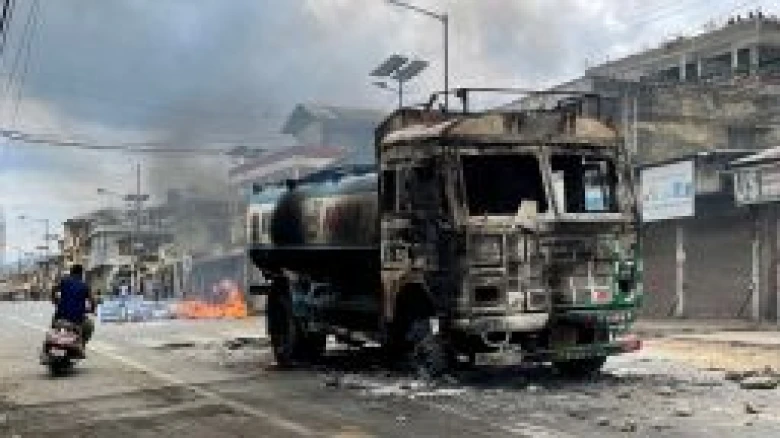Article

The Indian army has been deployed on the streets, and a five-day mobile internet shutdown is in effect.
Digital Desk: According to hospital officials and the Indian army,
ethnic violence in the Indian state of Manipur has killed more than 50 people,
hospitalized hundreds, and displaced 23,000 others.
According
to medical officials in Imphal, at least 55 people have died and 260 have been
hospitalized since violence erupted earlier this week between members of the
Kuki and Meitei ethnic communities.
Meanwhile,
the Indian military said that 23,000 civilians had left the conflict, with the
displaced people being sheltered in military camps and garrisons throughout the
state.
The
two ethnic groups have been fighting in the streets of Imphal, India's
easternmost state, and elsewhere.
According
to officials at Imphal hospitals the Regional Institute of Medical Sciences,
the Jawaharlal Nehru Institute of Medical Sciences, and Churachandpur District
Hospital, gunshot wounds are the most common type of injury.
"Most
of the patients are coming in with severe bullet injuries or having been hit in
the head with lathis [sticks]," Dr. Mang Hatzow of Manipur's Churachandpur
District Hospital told CNN.
Video
and photographs broadcast on local media showed automobiles and buildings on
fire, with heavy black smoke pouring from the streets.
The
Indian army has been deployed on the streets, and a five-day mobile internet
shutdown is in effect.
A
young tribal leader who works in Imphal told CNN that his house was vandalized
and trashed on May 4 and that he has been sleeping in an army camp since then.
"Unfortunately,
what we are witnessing here appears to be a very systematic, well-planned
series of attacks." "The execution is almost clinical, and they know
exactly where people from tribal communities live," said the leader, who
requested anonymity due to concerns for his safety.
"Many
houses have been burned, and all of our churches have been vandalized and some
have been burned." I barely fled since the mob had already entered the
house. I scaled the fence to the neighbor's house. I only brought my laptop bag
to this camp. "I'm out of ideas."
He stated
that his camp housed approximately 5,500 people and that Imphal had six or
seven camps in total.
"There
have been so many deaths," he went on to say. "A woman and her son
were driving to a camp. A mob met them on their way and battered the son to
death. The mother was also killed while attempting to protect her son."
On
Sunday, CNN reached out to the Manipur state administration and the Indian army
for comment. The state government did not respond immediately.
The
army claimed to have rescued 23,000 people and relocated them to operating
bases and military garrisons. It went on to say that there was a "ray of
hope" and a break in the conflict because of the rescue efforts of the
120-125 Army and Assam Rifles, which had been "working tirelessly for the
past 96 hours to rescue civilians across all communities, curb violence, and
restore normalcy."
It
also stated that it has increased surveillance efforts by utilizing drones and
helicopters.
Anusuiya
Uikey, the governor of the state, issued "shoot-at-sight" orders
earlier this week in an effort to bring the situation under control.
According
to a statement from Manipur's home department, the orders were authorized for
"extreme cases where all forms of persuasion, warning, reasonable force,
etc. had been exhausted" and the situation "could not be
controlled."
Skirmishes
originally erupted after hundreds of tribal people marched against the probable
inclusion of the state's predominant Meitei ethnic group in India's
"Scheduled Tribe" category, organized by the All Tribal Students
Union of Manipur.
color:black;letter-spacing:.3pt">For years, the Meitei group, which accounts
for almost half of the state's population, has agitated for recognition as a
scheduled tribe, which would grant them access to broader benefits such as
health care, education, and government jobs.
color:black;letter-spacing:.3pt">Scheduled tribes are among India's most
socioeconomically disadvantaged populations, with traditionally limited access
to education and job possibilities.
Other
tribal groups are concerned that if the Meitei community is granted scheduled
tribe status, they will not have a fair opportunity at jobs and other
advantages.
Leave A Comment